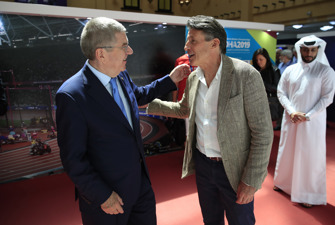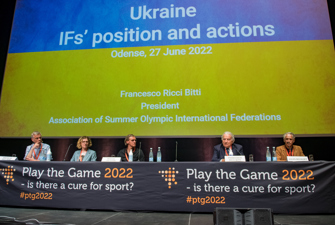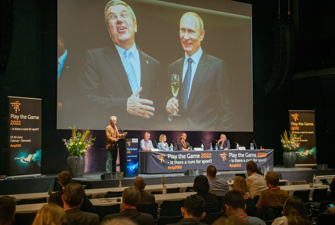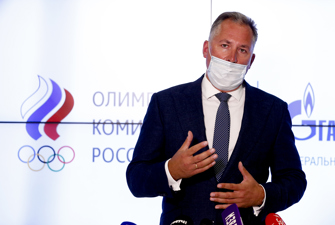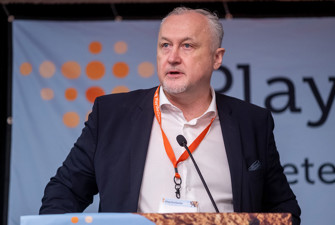Pride and propaganda: Russia’s reimagined sports world
Karim Zidan outlines how Russia is building an alternative sports arena alongside the conventional international stage that is centered around the bonds of friendship and bilateral relations that Russia currently maintains. Several new events and tournaments are being planned before and after the Olympic Games in 2024.
During the opening ceremony of the 2023 Commonwealth of Independent States (CIS) Games, Belarusian President Alexander Lukashenko—a staunch ally of Russian President Vladimir Putin and the man known as the “last dictator in Europe”—delivered a defiant speech in front of thousands of spectators where he claimed that the sporting sanctions imposed on Russia and Belarus due to the invasion of Ukraine was the act of “madmen” that had failed miserably.
“You are trying to eliminate strong competitors from international sport. You want to take away our sporting victories. You are killing the spirit and meaning of the Olympic Movement,” Lukashenko said during his speech. "This is a sign of weakness and your fear. This is an attempt to hide behind an iron curtain from the truth of life."
Lukashenko’s statements came in August 2023 as more than 2200 athletes from 22 countries arrived in the Belarusian capital of Minsk to take part in the second edition of the multi-sport event.
The countries taking part included nine members of CIS, the regional intergovernmental organisation formed following the dissolution of the Soviet Union in 1991—Armenia, Azerbaijan, Belarus, Kazakhstan, Kyrgyzstan, Russia, Tajikistan, Turkmenistan and Uzbekistan—as well as teams from Cuba, Egypt, Iran, Lebanon, Malaysia, Bahrain and the United Arab Emirates, among others. In contrast, the inaugural event in Kazan back in 2021 only featured the nine CIS members.
However, the event carried more significance in light of Russia’s invasion of Ukraine and the subsequent suspension of Russian and Belarusian athletes from international sports, including the Olympic Games.
In a statement published on The Kremlin website, Russian President Vladimir Putin stressed the importance of the CIS Games in strengthening “international humanitarian cooperation.”
"The current Games have significantly expanded geographically and united thousands of participants, their coaches, mentors and fans in Belarusian cities, and in the coming days they will provide athletes with a wonderful opportunity of competing with strong opponents," Putin concluded.
Russia would go on to top the standings with 288 medals, including 149 gold. Belarus placed a distant second with 236 medals of which 48 were gold.
Russia’s contingency plan for sports competitions
As Russia persists in its efforts to rejoin the international sporting arena, as evidenced by its participation in friendly football matches against Iran and Iraq despite exclusion from FIFA, the nation's prominent political figures are simultaneously implementing a contingency strategy — an alternative sports arena alongside the conventional international stage.
This development underscores the profound geopolitical, diplomatic, and strategic significance of sports on the global platform. Furthermore, it provides insight into Russia's ongoing ability to leverage its remaining political influence in order to maintain a degree of relevance within the realm of international sports, even when facing exclusionary challenges.
From pariah status to allowing some athletes in
In the immediate aftermath of Russia’s invasion of Ukraine, the world’s largest nation was transformed into a pariah in the world of sports. Russia’s national and club soccer teams were banned from international competition, including the 2022 World Cup in Qatar.
UEFA also cancelled its 45 million USD a year sponsorship deal with Russian state-owned oil giant Gazprom, and moved the Champions League final, which was due to take place in Putin’s hometown of St. Petersburg, to Paris. The International Paralympic Committee also moved to bar athletes from Russia and Belarus on the eve of the Paralympic Games in Beijing. Several international federations also took steps to ban Russian and Belarusian athletes from international competition.
Nevertheless, as the war approaches its second anniversary, numerous organisations have softened their stances, while others have welcomed the exiled entities back into the fold.
In March 2023, the International Olympic Committee (IOC) Executive Board put forth a proposal permitting individual athletes from Russia and Belarus to take part in international sports tournaments under certain conditions. Specifically, athletes from the two countries should not be "actively supporting" the ongoing war in Ukraine and must compete under a neutral status, without their flag or national anthem.
These recommendations, however, do not include the Paris 2024 Olympics, which IOC President Thomas Bach revealed would be decided upon “at the appropriate time.” In October, however, the IOC revealed that Russian athletes can be directly invited to next year’s Paris Games, reiterating the position that “we do not punish or sanction athletes for the acts of their officials or government.”
From the beginning of 2024 gymnasts from Russia and Belarus will be allowed to take part in sanctioned competitions as "individual neutral athletes". Photo: Anadolu Agency/ Getty Images
Sports federations struggle with how to handle Russian athletes
Some governing bodies have chosen to follow the IOC’s recommendations. For example, gymnasts from Russia and Belarus will be allowed to take part in sanctioned competitions as "individual neutral athletes" from the start of 2024. Combat sports such as judo and taekwondo have allowed Russian and Belarusian athletes to return to competition, leading Ukraine to boycott the world championships in both judo and taekwondo.
Most recently, the International Paralympic Committee voted against maintaining a full ban of Russia and Belarus, effectively allowing Russian and Belarusian athletes to compete as neutrals at next year's Paralympics in Paris.
However, Russia’s return to international sports has not been entirely smooth. The Union of European Football Associations (UEFA), which governs football in Europe, recently took the decision to reinstate Russia’s under-17 teams to European competition. The controversy led to UEFA vice-president Karl-Erik Nilsson resigning as boss of the Swedish Sports Confederation after it was revealed he voted to readmit the Russian teams.
Furthermore, UEFA went on to reverse its decision to allow Russia’s under-17 teams to compete in international competition, claiming that “no technical solution to allow Russian teams to play could be found.”
Earlier this month, Russia suffered yet another setback when the IOC took the decision to suspend the Russian Olympic Committee (ROC) for recognising regional sport organisations from four occupied territories annexed from Ukraine.
“The unilateral decision taken by the Russian Olympic Committee on 5 October 2023 to include, as its members, the regional sports organisations which are under the authority of the National Olympic Committee (NOC) of Ukraine (namely Donetsk, Kherson, Luhansk and Zaporizhzhia) constitutes a breach of the Olympic Charter,” the IOC said in a statement.
While significant, the ruling will not affect any decision on Russian and Belarusian athletes’ participation at the Paris 2024 Olympics. The IOC has not made a final decision regarding Russia and Belarus’ participation at the upcoming Paris Games, which led to Putin issuing a statement accusing the IOC of politicising sports.
"As for the Olympic movement itself, I would say this. I think that today's leadership of international federations, the International Olympic Committee itself, they distort the original idea of Pierre de Coubertin - sport should be outside of politics," he said. "It should not divide, but unite people."
Putin’s determination for Russia to participate at major international events underscores the importance that such sporting competition play in his political agenda. The Kremlin utilises sports as a means for soft power, and their success at such events helps promote Russia as a healthy and thriving nation. It is also a tool for propaganda—a feature that Putin capitalised on during the 2014 Olympic Games and the 2018 World Cup.
Meanwhile, Russia’s relative isolation from international sports has limited Putin’s capacity to amplify his propaganda even though he still has allies stationed in various international sports organisations. It has also caused some athletes to consider switching nationalities in order to be eligible for events. This, in turn, diminishes from the image that the Kremlin aims to present through sports, which is why the regime is currently considering a way to bar athletes from switching nationalities.
Plans for World Friendship Games in 2024
In May 2023, Russia declared its intention to host an international multi-sport event known as the “World Friendship Games.”
Russian Sports Minister Oleg Matytsin made this announcement while meeting with President Putin and mentioned that the event is slated to take place following the conclusion of the Paris 2024 Games.
"We consider it necessary to use the resources of both Russian and international public and state organisations to the maximum for the successful holding of the Games, which should be held on a regular basis in the future."
In 1984, the former Soviet Union also orchestrated a series of multi-event games known as the Friendship Games, in which eight of its allied nations participated. These games were established as an alternative to the Los Angeles 1984 Olympic Games, which garnered notoriety due to the boycott led by the Soviet Union and its allies, which followed an American-led boycott of the 1980 Moscow Games.
The Friendship Games served as a significant geopolitical counterpoint to the Olympics, reflecting the Cold War tensions of the era. They also served as a reminder of the complex interplay between sports and geopolitics, illustrating how major international events can become tools of political expression and diplomatic manoeuvring—facets that gain heightened relevance in the wake of Russia’s war on Ukraine.
Russian Sports Minister Oleg Matytsin announced in May 2023 that the “World Friendship Games” is slated to take place following the conclusion of the Paris 2024 Games.
Photo: SOPA Images/ Getty Images
Other plans for international tournaments and events
During his meeting with Putin, Matytsin discussed ambitions to host various other international events, noting that the “situation today confirms the importance and necessity of further strengthening the sports agenda within the framework of interstate associations.”
Among the events referenced were the aforementioned CIS Games in Belarus, as well as the upcoming BRICS Games in 2024.
Considered a rival to the Group of Seven (G7) bloc, BRICS is a geopolitical alliance between Brazil, Russia, India, China, and South Africa, though the bloc is set to expand following a recent announcement that six new members — Argentina, Egypt, Ethiopia, Iran, Saudi Arabia and the United Arab Emirates — have been invited to join.
With Russia set to host the annual BRICS Summit in 2024, Putin announced plans to host a “Games of the Future” international tournament in Kazan along with other cultural exchanges for the bloc. The event would feature 25 disciplines and would take place a month before the start of the Paris Games.
"Russia, to be sure, will continue to promote in every way the further development of sports contacts and youth exchanges," Putin said.
While the Kremlin has insisted that the multi-sport event is not meant to rival the Olympic Games, the government has nevertheless begun to reap public relations benefits from presenting itself as an alternative to the isolatory West.
For instance, Russia’s Foreign Minister, Sergey Lavrov, claimed that Russia planned to invite athletes from “so-calleded unfriendly nations,” an act that would be in stark contrast to the ongoing debate over Russia and Belarus’ exclusion from the Paris Games.
“These tournaments are open to athletes from any country, even the so-called unfriendly nations,” Lavrov told Russian state-media outlet Tass. “For there are no unfriendly athletes, unfriendly citizens or even unfriendly countries - there are unfriendly governments who came, for a certain period, to power in nations whose people and citizens have always maintained very good and friendly ties with us.”
Russia has also expressed interest in hosting an inaugural multi-sport event for member states of the Shanghai Cooperation Organization (SCO), a political, economic, international security and defence organisation that includes China, India, Pakistan, Iran, Kazakhstan, Kyrgyzstan, Russia, Tajikistan and Uzbekistan.
A vision based on bonds with nations outside Europe
While the Kremlin's primary preference remains a return to the international stage, where it can participate in prestigious events like the Olympic Games, there is a noteworthy temporary shift in President Putin's vision—an envisaging of a novel sports landscape centered around the bonds of friendship and bilateral relations that Russia currently maintains.
This shift is particularly intriguing as it reflects the geopolitical realities stemming from Russia's actions in Ukraine and the varying stances of different regions worldwide, most notably the Middle East, Africa, and a substantial part of Asia, compared to Europe and North America regarding the ongoing conflict.
This strategic recalibration by Russia underscores the profound impact of the Ukraine invasion on international dynamics and how it has led to a significant divergence in global perspectives.
While Europe and North America have largely condemned Russia's actions and imposed sanctions, other regions, including the Middle East, Africa, and parts of Asia, have demonstrated a different approach. Some countries in these regions have either refrained from taking a firm stance on the matter or have shown support for Russia's actions, driven by their own geopolitical interests or historical ties.
In essence, Russia's current sports strategy represents a calculated effort to preserve its international standing and derive benefits from its relationships with nations that do not align with the prevailing Western narrative.
While the Kremlin's long-term goal may still be a return to the mainstream international sports arena, it recognises the utility of adapting to the changing global landscape, ensuring that even amidst adversity, it can continue to reap the rewards of sports diplomacy.

